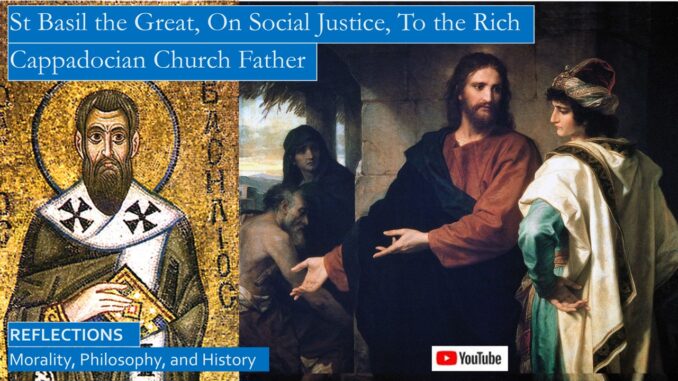
Why did St Basil the Great deliver several homilies on Social Justice?
What advice does St Basil offer to the wealthy Christians? Should all Christians give alms to the poor? What excuses are excusable?
What does St Basil say about women who love expensive perfumes?
Was St Basil’s advice for fellow monks applicable for laypeople today?
YouTube video for this reflection: https://youtu.be/qG8uno-WdWA
LIFE AND EDUCATION OF ST BASIL THE GREAT
St Basil’s name means “royal,” and although we are not sure if his family had senatorial rank, he was indeed born into a noble family who owned multiple family estates, likely with numerous slaves. St Basil’s homily To the Rich includes “an impressive description of the leisurely pursuits of the landed aristocracy: hunting, horseback riding, baths in the city and countryside,” which he undoubtedly enjoyed in his youth when he was living in the world. When he describes the “houses, dress, occupations and mannerisms” of the wealthy, he speaks from experience.
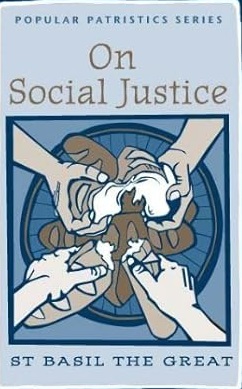
St Basil’s wealth and social status opened to him the best educational opportunities in the ancient world, studying first in Caesarea and Constantinople, and then at the university at Athens. There he met and became best friends with St Gregory of Nazianzus, together they resolved to pursue the true philosophy of the Christian life. Together with St Basil’s brother, St Gregory of Nyssa, they are known as the Cappadocian Church Fathers. St Basil gave a portion of his inheritance, then visited recently organized monastic communities. His mother and sister had already organized a convent on one of their estates, he founded a small monastic community there also.
We have already reflected on the elegant translations of the works of St Gregory of Nyssa on the Sermon on the Mount and another work by St Basil. We look forward to reflecting on St Gregory’s Life of Moses, which inspired Dionysius the Areopagite.
St Gregory of Nyssa, Beatitudes, Blog 2, Blessed are the Poor in Spirit
http://www.seekingvirtueandwisdom.com/st-gregory-of-nyssa-beatitudes-blog-2-blessed-are-the-poor-in-spirit/
St Gregory of Nyssa, Beatitudes, Blog 3, Blessed are the Meek and Those Who Mourn
http://www.seekingvirtueandwisdom.com/st-gregory-of-nyssa-beatitudes-blog-3-blessed-are-the-meek-and-those-who-mourn/
St Gregory of Nyssa, Beatitudes, Blog 4, Blessed are the clean of heart and the merciful
http://www.seekingvirtueandwisdom.com/st-gregory-of-nyssa-beatitudes-blog-4-blessed-are-those-who-do-not-envy/
St Gregory of Nyssa, Beatitudes, Blog 5, Blessed are the Peacemakers and the Persecuted
http://www.seekingvirtueandwisdom.com/st-gregory-of-nyssa-beatitudes-blog-5-blessed-are-the-peacemakers-and-the-persecuted/
St Gregory Of Nyssa, on the Beatitudes, and the Commandment, DO NOT ENVY
https://youtu.be/xaqFTPgoDI0
St Gregory of Nyssa, Beatitudes, Blog 1, The Allegory of the Cave
http://www.seekingvirtueandwisdom.com/st-gregory-of-nyssa-beatitudes-blog-1-the-allegory-of-the-cave/
CS Lewis’ Great Divorce, An Allegory of Hell and Plato’s Cave
http://www.seekingvirtueandwisdom.com/cs-lewis-great-divorce-an-allegory-of-hell-and-platos-cave/
St Gregory Of Nyssa on Beatitudes, Plato’s Allegory of the Cave, and CS Lewis and the Great Divorce
https://youtu.be/wuqwy3GyO_4
What led St Basil to compose his four homilies on Social Justice? Our editor notes that “in 369 AD, within a few years of his ordination to the priesthood, major catastrophe struck Caesarea and the surrounding area, a drought followed by a severe famine. Rivers and springs dried up and crops failed, resulting in an acute food shortage throughout the region.”[1]
Whenever we comment on the teachings of the Eastern Church Fathers, we often face a simple problem: How can we improve and comment on their message, which they so ably express? Quite often, we merely repeat what we think are their most quotable teachings. We encourage you to read these works for yourself.
ST BASIL THE GREAT: HOMILY TO THE RICH
This homily is based on this story from Matthew:
“And behold, one came up to Jesus, saying, “Teacher, what good deed must I do, to have eternal life?” And he said to him, “Why do you ask me about what is good? One there is who is good. If you would enter life, keep the commandments.”
He said to him, “Which?” And Jesus said, “You shall not kill, You shall not commit adultery, You shall not steal, You shall not bear false witness, Honor your father and mother, and, You shall love your neighbor as yourself.” The young man said to him, “All these I have observed; what do I still lack?” Jesus said to him, “If you would be perfect, go, sell what you possess and give to the poor, and you will have treasure in heaven; and come, follow me.” When the young man heard this, he went away sorrowful; for he had great possessions.[2]
St Basil first praises this rich young man for posing this key question not to the Pharisees but to Jesus himself, the Teacher of Truth, asking what he should do to inherit eternal life.” But he cannot part from his great possessions, because “he does not focus on what is truly good, but rather looks to what pleases most people.”
St Basil speaks to the Rich Young Man: “It is thus evident that you are far from fulfilling the commandment, and that you bear false witness within your own soul that you have loved your neighbor as yourself. Look, the Lord’s offer shows just how distant you are from true love! For if what you say is true, that you have kept from your youth the commandment of love and have given to everyone the same as to yourself, then how did you come by this abundance of wealth?”
St Basil continues: “The more you abound in wealth, the more you lack in love. If you had truly loved your neighbor, it would have occurred to you long ago to divest yourself of this wealth. But now your possessions are more a part of you than the members of your own body, and separation from them is as painful as the amputation of one of your limbs.”
St Basil warns the wealthy: If you have “sound judgment, you should should recognize that you have received wealth as a stewardship, and not for your own enjoyment; thus, when you are parted from it, you rejoice as those who relinquish what is not really theirs, instead of becoming downcast like those who are stripped of their own.”
“When you have the opportunity to exchange corruptible things for the Kingdom of Heaven, you shed tears, spurning the one who asks of you and refusing to give anything, while contriving a million excuses for your own expenditures,”[3] and if St Basil were alive today, he would also ask how you cannot give to the poor but yet afford annual European vacations while staying in four-star hotels.
St John Chrysostom is even more direct: When we do “not share our own wealth with the poor, we steal from the poor, depriving them of their means of life. We do not possess our own wealth but theirs. If we have this attitude, we will certainly offer our money; and by nourishing Christ in poverty here and laying up great profit hereafter, we will be able to attain the good things which are to come.”[4]
I worked in several restaurants in high school and college, these memories return when I listen to Kacey Musgrave’s country song, Blowing Smoke, which accurately describes the quiet desperation of Southern waitresses trying to scrape together a living. Kacey must have worked as a waitress herself. Why would you want to stiff one of these sweet waitresses?
https://www.youtube.com/watch?v=JEsEUpk5rU8
St Basil would tell you to never stiff your waitresses. Maybe they are having a bad day, or if they are really struggling, maybe your church has a ministry that helps to feed the poor. If they are not sweet, you must assume they are living a hard life. Don’t stiff the waitresses, God is punishing them enough, because they are waitresses! God hasn’t given everyone the brains to go to college! Very few waitresses can become country music stars. Some waitresses wait tables because God did not give them the ability to be successful in a professional career!
If you don’t want St Basil to fuss at you when you go to sing with Elvis, you especially should not refuse to pay the recommended gratuities to cruise ships. If you don’t tip, their workers don’t get paid much! If you don’t trust them to pay the waiters, then tip them extra, because the standard tip is also split between the housekeeping staff. If you ask the cruise ship waiters, you will likely discover that none of the cruise ship employees have any 401K or other retirement plans. They don’t pay these waiters squat, yet they expect them to sing and dance and pretend to their customers that they love their jobs!
St Basil teaches us: “When wealth is scattered in the manner which our Lord directed, it naturally returns, but when it is gathered, it naturally disperses. If you try to keep it, you will not have it; if you scatter it, you will not lose it.”
This may be true for members of the upper class like St Basil, but it is not dependably true for ordinary schmucks like me. St Basil also counsels those monks who have renounced the world and their riches to work part-time so they can give alms to the poor.
How can you be a Christian and refuse to give to the beggars begging for food in a hot sunbeaten intersection? Are you worried that they will go back to the grocery store for refunds for drugs and booze? Then buy cans of fish they can easily eat with their fingers. Or buy small sandwiches at the deli, if there are four in the pack, Jesus will let you eat one so the bums can’t ask for a refund for the other three sandwiches.
St Basil comments on the futile plans of the wealthy to retain their wealth. “There should be,” they say, “some wealth for spending, and some held in reserve, while the allowance for daily provisions should exceed the level of mere necessities. Some will be for comforts within the house, and some for outward display; some to make traveling comfortable, and some to make life splendid and luxurious at home.”
If St Basil were alive today, he would ask: How many of us who are well-off look forward to our annual European vacation? How many spend tens of thousands of dollars on vacation, yet give little more than a few hundred dollars in alms to the poor? How many give more to the church than they spend on fancy vacations?
St Basil rues: “I know many who fast, pray, sigh, and demonstrate every manner of piety, so long as it costs them nothing, yet would not part with a penny to help those in distress.”[5]
When I was active in the divorce support ministry, on rare occasion some dead broke single mother would attend whose husband had left them, and they could not afford the attorney retainer to compel them to pay child support. Sometimes thoughts and prayers are not enough, sometimes someone just needs to take the risk and loan them a few thousand dollars so they can hire an attorney. This is like lending to family, you cannot get upset if they never pay you back. Until these mothers can quit worrying about how they will feed their children, thoughts and prayers don’t mean squat.
As St James exhorts us in his Epistle: “If a brother or sister is ill-clad and in lack of daily food, and one of you says to them, ‘Go in peace, be warmed and filled,’ without giving them the things needed for the body, what does it profit?”[6]
https://www.divorcecare.org/ and https://ascensionpress.com/collections/surviving-divorce
ST BASIL AND ST JOHN OF THE CROSS ON VIRTUOUS WIVES
St Basil warns the men that they should choose their wives wisely, they should marry women who in increase in them their Love of God and neighbor.
St Basil: “If your wife happens to be a money-loving person, then the disease is doubled in its effects. She stirs up the love of luxury and inflames the craving for pleasure, spurring on fruitless pursuits.”
St Basil continues: “No amount of wealth, even if rivers should run with gold, can support the desires of a woman who buys imported perfume as though it were common olive oil from the marketplace, and chooses porphyry and sea silk, the flowers of the ocean, over ordinary wool from sheep.” “Indeed, those who love gold do not mind being bound with manacles, so long as their chains are of gold.”
St John of the Cross teaches us that Christians should only choose close friends who increase in their hearts their Love of God, who will better enable them to love their neighbor as themselves. This is especially true for who should be the closest friend we have: our spouses.
St John of the Cross, Dark Night of the Soul, Seven Capital Sins and Best Type of Close Friend
https://seekingvirtueandwisdom.com/st-john-of-the-cross-dark-night-of-the-soul-seven-capital-sins-and-best-type-of-close-friend/
https://youtu.be/DgL7Y5pIFAU
St Basil teaches us not to be tempted to find excuses not to give alms to our poorer neighbor. “But you claim you are yourself a pauper, and I concur. Now a pauper is someone who lacks many things, and the insatiability of your desire makes you lack many things indeed. You diligently strive to add ten more talents to ten you receive, and when you have twenty, you seek to add twenty more.”
St Basil would describe this as the rat race: “The wealthy do not rejoice in what they have, no matter how much it is, so much as they lament what they still lack, or think they lack. Their soul is eaten away with cares as they compete in the struggle for success.” [7]
In another homily, St Basil warns us that hoarding wealth, not giving to the poor, only saving for yourself leads to the sin of covetousness and envy. We also discuss how envy drove King Ahab to accept the gift of Naboth’s vineyard. His evil wife Jezebel had slandered Naboth’s reputation to have him executed without cause to gain control of his vineyard. We also reflect on the sordid tale of the evil pagan Queen Jezebel and King Ahab In our reflection on St John of the Cross.
St Basil the Great, Cappadocian Church Father, On Envy
http://www.seekingvirtueandwisdom.com/st-basil-on-envy/
https://youtu.be/XnFUrFKoF7s
St Cyprian on Envy, Jealousy, Covetousness, and Patience http://www.seekingvirtueandwisdom.com/st-cyprian-on-envy-and-jealousy/
https://youtu.be/_LIwHZCzDfg
CS Lewis’ Mere Christianity: Forgiveness, Pride, and Envy. Can Pride Ever Be Good?, Book 3
https://seekingvirtueandwisdom.com/cs-lewis-mere-christianity-forgiveness-pride-and-envy-can-pride-ever-be-good/
https://youtu.be/Pmu6hzU5RaQ
Do Not Covet, Writings by Eastern Church Fathers, Dwight Moody, and Dr Laura
https://youtu.be/7uPNXJuDi0A
https://youtu.be/8QHrtKGDzKM
Catholic Catechism and Church Fathers, Do Not Envy, Purification of the Heart, CCC 2517-2533
https://www.seekingvirtueandwisdom.com/catholic-catechism-do-not-envy-purification-of-the-heart-blog-3/
https://youtu.be/v_BmOU1VcHQ
St Basil asks us: “What well-dressed person has ever been granted even one additional day of life? Has death ever spared anyone on account of wealth? Has sickness departed from anyone on account of possessions? How long shall gold be the oppression of souls, the hook of death, the lure of sin? How long shall wealth be the cause of war?”
What depresses me about his reflection is how the sin of theft infects each round of religious persecution and the struggles surrounding the Protestant Reformation. Quite often the desire to seize the wealth of the wealthy Jews sparked anti-Semitic pogroms over the ages, from medieval times to Nazi Germany. And the politics surrounding the Protestant Reformation in both Europe and England meant that Catholic Church assets were seized, which helped solidify the Protestant Reformation, because if the nobles and kings were to revert to Catholicism, they would have to return the property they stole from the church.
CAN YOU BE LESS CHARITABLE IF YOU HAVE CHILDREN?
St Basil ponders: “But wealth is necessary for rearing children, someone will say. This is a specious excuse for greed; although you speak as though children were your concern, you betray the inclinations of your own heart. Do not impute guilt to the guiltless! They have their own Master who cares for their needs. They received their being from God, and God will provide what they need to live.”
St Basil here is also revealing that he is a celibate monk who has no children. St John Climacus, author of the classic Ladder of Divine Ascent, offers kinder advice to laymen. He tells us that “some people living carelessly in the world have asked me:
‘We have wives and are beset with social cares, and how can we lead the solitary life?’”
St John Climacus replied to them: “Do all the good you can; do not speak evil of anyone; do not steal from anyone; do not lie to anyone; do not be arrogant to anyone; do not hate anyone; do not be absent from the Divine Services; be compassionate to the needy; do not offend anyone; do not wreck another man’s domestic happiness, and be content with what your own wives can give you. If you behave in this way, you will not be far from the Kingdom of Heaven.”[8]
Laymen can and should read the monastic classics like the Ladder of Divine Ascent and the writings of the Cappadocian and Early Church Fathers, because living the Christian life is itself a type of monastic calling. But since laymen are not monks, you need to use common sense when applying the advice to your life situation, some minor allegorizing is needed.
John Climacus: First Step of the Ladder of Divine Ascent
http://www.seekingvirtueandwisdom.com/st-john-climacus-first-step-on-the-ladder-of-divine-ascent/
https://youtu.be/Fco0W3bt5GA
But St Basil cautions parents: “Was the command found in the Gospel, ‘If you wish to be perfect, sell your possessions and give the money to the poor,’ not written for the married? After seeking the blessing of children from the Lord, and being found worthy to become parents, did you at once add the following: ‘Give me children, that I might disobey our commandments; give me children, that I might not attain the Kingdom of Heaven?’”
Jesus was perfect, and our monk and abbot St Basil is far more perfect than I, and neither of them married. Timothy does exhort us: “A woman will be saved through bearing children, if she continues in faith and love and holiness, with modesty,”[9] but how can parents teach their children how to love all their neighbors, if they never encounter their poorer neighbors?
Older children should have some contact with the poor lest their hearts harden out of ignorance. Our family life should encourage us to love our neighbors who are our acquaintances, or whom we hear about on television. It would be good to join a church that has many active ministries that reach out to the community. Likewise, our church should have some outreach to the poor, if they wish to be like the early church.
St Basil warns that many of you who are wealthy may say, “’I will enjoy all these things during my life, but after my death I will leave my goods to the poor, making them beneficiaries of my will and granting them all my possessions.’ When you are no longer among your fellow human beings, then you will become a philanthropist! When I see you dead, then I will call you a lover of your brothers and sisters.”
St Basil may be a bit harsh, but he speaks wisely in that you should give to the poor something first now, and then in your will if you wish. Perhaps St Basil is being sarcastic when he says, “You deserve great thanks for your magnanimity, since you have become so generous and noble-hearted after you were laid in the grave and your body had dissolved in the earth.”
St Basil argues that generosity while you are living counts more than after you die: “When you were still alive, squandering your years in luxury and wasting them on frivolous pursuits, you never bothered to consider the plight of the needy.”
CHRISTIANITY, SOCIAL JUSTICE, DEI, AND WOKENESS
Our editor notes that as many as one-third of the population was enslaved, though in a footnote he admits that reliable demographic statistics just do not exist for the ancient world, we are always guessing. St Basil may not include the enslaved in his descriptions of the poor since their masters clothe and feed them. But he does remind us in his homily “Against Those Who Lend at Interest,” that indigent parents sometimes sold their children into slavery if they could not afford to support them and feed them.
Although slaves in ancient Greece, Rome, and Israel under the monarchs were chattel slaves, or slaves that were the property of their master, as opposed to servants, they were often seen as part of the family, unless they were unfortunate to work on the large agricultural plantations or the mines. Many slaves in the ancient world were analogous to today’s minimum-wage employees or field workers.
If St Basil were alive today, what would he say about the wage slaves, those who try to make a living earning minimum wage? Jordan Peterson reminds us that many people don’t have the ability to excel in college, that there are some people whose abilities trap them in lower-rung jobs.[10]
Slaves in the Ancient World, Blog 1, Were Slaves the Employees of the Ancient World?
http://www.seekingvirtueandwisdom.com/slaves-in-the-ancient-world-blog-1-were-slaves-the-employees-of-the-ancient-world/
Slaves in Ancient Greece and Rome, Blog 2
http://www.seekingvirtueandwisdom.com/slaves-in-ancient-greece-and-rome-blog-2/
https://youtu.be/O67cmVRvBtA
Teachings about Slavery in the Bible, the Stoics, and by the Early Church Fathers
http://www.seekingvirtueandwisdom.com/teachings-about-slavery-in-the-bible-and-by-the-early-church-fathers/
https://youtu.be/poyvJajCXnE
Ordinary Life for Romans Under Stoic Emperor Marcus Aurelius
https://seekingvirtueandwisdom.com/ordinary-life-for-romans-under-stoic-emperor-marcus-aurelius/
https://youtu.be/9hgSbcgbCJw
Ordinary Life and Justice in Ancient Athens, Rome, and Israel
http://www.seekingvirtueandwisdom.com/ordinary-life-and-justice-in-the-ancient-world/
https://youtu.be/vl8KGL5Yx2w
In our reflection on Woke Bible Verses, we are defining the woke as those who Love God and love their neighbor, as Jesus and Deuteronomy exhort us. St Augustine is my favorite Catholic saint because in every major work he explicitly repeats this two-fold love that is the cornerstone of Christianity. And St Augustine teaches us that we should interpret Scriptures in light of this two-fold Love of God and neighbor, and that if any story in the Bible appears to violate this two-fold love, then it should be interpreted spiritually and allegorically. And Anders Nygren book on Christian Love: Eros and Agape, as seen through the ages is simply outstanding.
Blessed Are the Poor, Woe to the Rich, and Other Woke Compassionate Bible Verses
https://seekingvirtueandwisdom.com/blessed-are-the-poor-woe-to-the-rich-and-other-woke-bible-verses/
https://youtu.be/576TYemgA8o
Hillel and Jesus, Reflections on Rabbi Telushkin’s Observations
http://www.seekingvirtueandwisdom.com/hillel-and-jesus-reflections/
Comparing Hillel and Shammai to Jesus
http://www.seekingvirtueandwisdom.com/comparing-hillel-and-shammai-to-jesus/
More Stories and Sayings of Hillel and Shammai
http://www.seekingvirtueandwisdom.com/more-stories-and-sayings-of-hillel-and-shammai/
Jesus, Hillel, and Shammai, Loving God and Neighbor
https://youtu.be/ygxn2qqGnOI
St Augustine: On Christian Teaching, aka On Christian Doctrine, How To Read Scripture
http://www.seekingvirtueandwisdom.com/st-augustine-on-christian-teaching-how-to-read-scripture/
https://youtu.be/uQCnAJMPoos
Anders Nygren, On Christian Agape-Love and Eros-Love in Gospels and Pauline Epistles
https://seekingvirtueandwisdom.com/anders-nygren-on-christian-agape-love-and-eros-love-in-gospels-and-pauline-epistles/
https://youtu.be/KniBalQMemM
We will also reflect on St Basil’s homilies on the parable, I Will Tear Down My Barns, and In Time of Famine and Drought, and Against Those Who Lend at Interest.
Was St Basil WOKE? St Basil the Great On Social Justice, Parable of the Rich Fool
https://seekingvirtueandwisdom.com/was-st-basil-woke-st-basil-the-great-on-social-justice-parable-of-the-rich-fool/
https://youtu.be/UDQIZ81VfsY
St Basil on Social Justice: Assisting the Poor During a Famine in a Roman Province
https://seekingvirtueandwisdom.com/st-basil-on-social-justice-assisting-the-poor-during-a-famine-in-a-roman-province/
https://youtu.be/c8YXs7y4RrU
CONCLUSION
St Basil challenges us: “What neighbor, what confidant, what friend is not swept away? Nothing withstands the influence of wealth. Everything submits to its tyranny; everything cowers at its dominion.” “Wherever you turn your gaze, you will clearly behold the apparitions of your evil acts: here the tears of the orphan, there the groaning of the widow, elsewhere the poor whom you have trampled down, the servants whom you have brutalized, the neighbors whom you have treated outrageously.”[11]
St Basil, if he lived today, would add to these evil acts those who lay off your hard-working employees simply so the business can meet its quarterly earnings pronouncements, while the top executives earn twenty or fifty or hundreds of times more than their average employees, not counting the immense wealth created from stock options granted for free.
DISCUSSING THE SOURCES
This writing by St Basil the Great, On Social Justice, is part of the Popular Patristic Series of St Vladimir’s Seminary Press. Usually these are excellent translations, some volumes also have the Greek, but not this volume. And the introduction and footnotes were excellent. They didn’t discuss how many ancient manuscripts survived, but likely multiple copies survived, since the Cappadocian Church Fathers were beloved by the early church.
[1] St Basil the Great, On Social Justice, translated by C Paul Schroeder (Crestwood, NY: St Vladimir’s Seminary Press, 2009, originally after 369 AD), Introduction, pp. 15-21.
[2] https://www.biblegateway.com/passage/?search=matthew%2019%3A16-22&version=RSVCE
[3] St Basil the Great, To the Rich, included in On Social Justice, pp. 41-47.
[4] https://blog.acton.org/archives/18664-chrysostom-on-the-poor.html quoting St John Chrysostom, On Living Simply, Sermon XLIII, also in collection of essays, On Wealth and Poverty, https://www.oca.org/reflections/fr.-steven-kostoff/st.-john-chrysostom-who-is-the-poor-man-and-who-is-the-rich
[5] St Basil the Great, To the Rich, included in On Social Justice, pp. 41-46.
[6] https://www.biblegateway.com/passage/?search=James%202%3A15-16&version=RSVCE
[7] St Basil the Great, To the Rich, included in On Social Justice, pp. 47-58.
[8] St John Climacus, Ladder of Divine Ascent, Holy Transfiguration Monastery, p. 9, Step 1, Paragraph 21.
[9] https://www.biblegateway.com/passage/?search=1%20Timothy%202%3A15&version=RSVCE
[10] https://www.facebook.com/watch/?v=1179940885731527, excerpted from: https://www.youtube.com/watch?v=D7Kn5p7TP_Y
[11] St Basil the Great, To the Rich, included in On Social Justice, pp. 51-52.

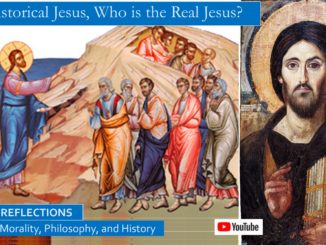
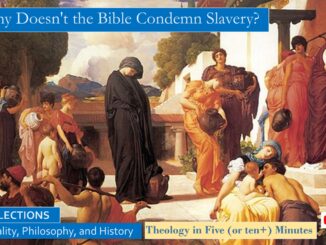
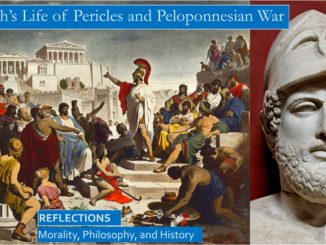
3 Trackbacks / Pingbacks